- TMJ disorders affect 7 out of 10 at some time in their life. While only 1 in 4 people are aware or report symptoms to their dentist or medical practitioner.
Temporomandibular disorders (TMD) is a caused by problems with the functioning of the temporomandibular joint where your cheekbone and your jaw connect.
What are the symptoms of TMD?
Symptoms of TMD may be difficult to identify as they often involve seemingly unrelated party of the body however the main symptoms include:
- Facial pain and tenderness
- Pain in the jaw (especially the joint area)
- Neck, shoulder and ear pain when you chew or speak
- Jaw locking or clicking when you open your mouth wide e.g. when yawning
What causes TMD?
The most common cause of TMD is malocclusion which is a misalignment of the jaw presenting as an overbite, underbite or crossbite.
What causes TMJ disorder?
- Missing Teeth
- Grinding or clenching of teeth
- Mouth Breathing
- Wrongly shaped dental fillings, crown or bridges
- Modern Diet- Not enough hard chewy foods
- Misaligned teeth
Untreated TMJ
The possible outcomes if TMJ disorders are not addressed, include:
- Limited jaw movement
- Locked Jaw
- Temporalis Headaches, Migraines
- Pain when chewing, yawning or opening jaw widely
- Pain in or around the ears and cheeks
- Earaches, loss of hearing or ringing in ears
- Face, neck, back and shoulder pain
- Toothache
- Clenching and Grinding Teeth
- Further degeneration on the jaw joint
Who diagnoses TMJ disorder?
A physician and a range of medical specialists can correctly diagnose TMJ including your dentist, prosthodontist (prosthetic dentist), a maxillofacial specialist and an ENT specialist.
The experienced team at Lake View Dental on the Sunshine Coast can correctly diagnose TMJ disorder and are well equipped in order to treat the condition.
How to fix TMJ disorder?
The duration and type of treatment for TMJ may vary. However dental splints, mouthguards and prosthodontics have been found to be among the most effective treatments. Other treatments include:
- Symptomatic treatment with pain killers, physiotherapy, chiropractor and osteopath
- Symptomatic treatment with LLLT and splints
- Treatment to put the jaws in the right physiological position.
Patient Case Studies
Before
After
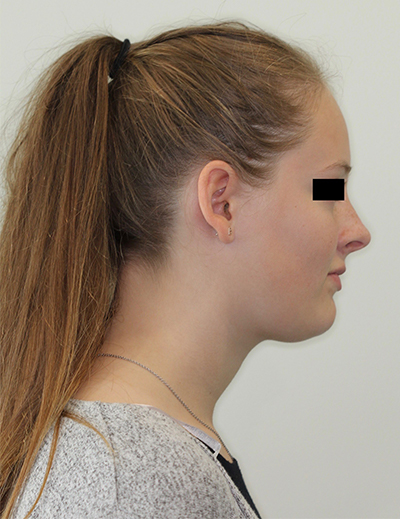
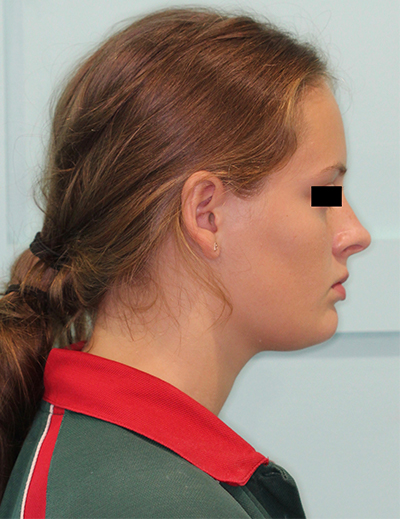
This lovely young patient presented with severe clicking and locking of her jaw joint causing severe pain. Her assessment revealed restricted movement of her lower jaw due to locking of the jaw joint on the left side. She was diagnoses on her X-rays as having insufficient growth on her upper jaw due to mouth breathing that has resulted in some teeth positioning problems resulting in the locking of her lower jaw.
She was treated with 8 months of jaw development and we are pleased to note that she has regained her jaw movement with no pain or clicking.
Before
After
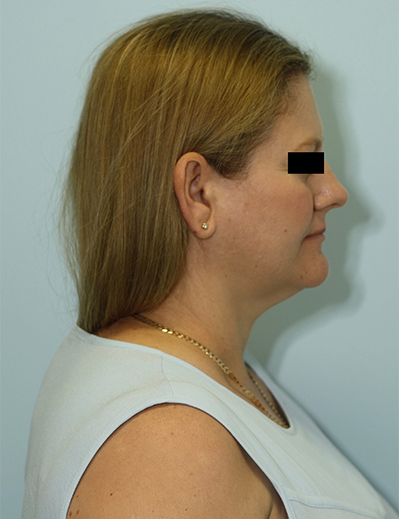
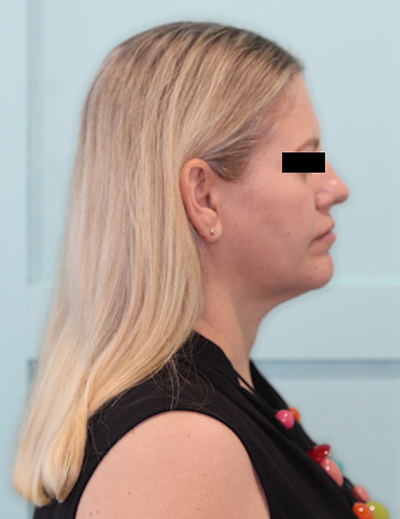
This lovely patient, a medical professional, has had longstanding jaw clicking and jaw joint and facial pain. She also suffered with on average 4 migraines a month. The assessment revealed that this patients symptoms could be attributed to mid face deficiency that has resulted in her lower jaw being forced back compacting her jaw joints causing the pain and clicking.
The treatment option decided upon was upper jaw development and lower jaw de-compaction to allow for better movement and better breathing. We did 10 months of jaw development and this patients jaw has stop clicking and there is no jaw joint pain. Also her migraine frequency has decreased significantly to 1 migraine in 8 months. She also reports better sleeping as her breathing has improved and she feels less pain.
Before
After
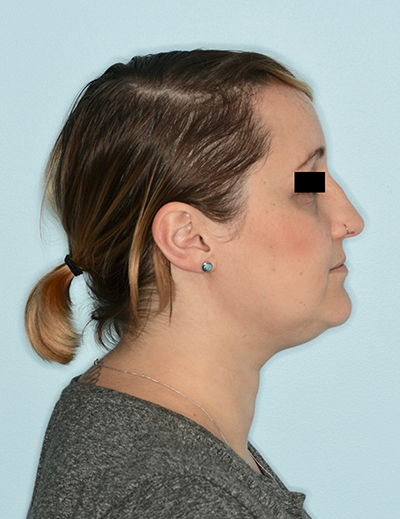
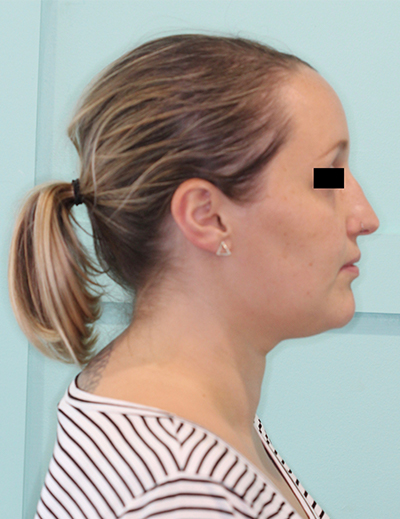
This lovely patient expressed the desire for improved facial aesthetics, help with her breathing and TMJ problems.
In the before picture we noted her head as being extended forward jutting her chin out rotating her head up and forward. This rotation is to make it easier for her to breath resulting in an unnatural head position. On the X-ray diagnosis we noted her top jaw being insufficient and further back than where it should be, this in turn made her nose look relatively bigger and more hooked as the top jaw was pulling the nose back.
The after picture is a result of a Jaw Development Appliance increasing the forward position of the top jaw that allowed for the head to be held in a more relaxed and balanced position while still allowing easy breathing. The improvement in facial aesthetics, breathing, posture jaw joint clicking has been significant. This was achieved without any surgery.
TMD Treatment at Lake View Dental Kawana, Sunshine Coast
Find our more information about TMJ disorder and treatment during a personalised consultation with one of our experienced Lake View dentists.
Contact us today.
FAQs
In Dr Ian’s previous experience, if a patient has frequent headaches it could be in relation to their jaw or head positioning. This can also be related to TMJ disorder and cause neck and back pain.
However, it is also important to point out that you could be experiencing TMD related symptoms and not have TMD. The best way to find out for sure is to book your appointment with Dr Ian so he can personally examine your case.
Yes, TMJ splints are a method that we commonly employ here at Lake View Dental.
Lower jaw repositioning splints can help to reposition the lower jaw to a more functional, natural, balanced position. This very specific treatment is dedicated to healing the jaw joint.
It is very possible that your teeth may hurt by some of the symptoms associated with TMJ Disorder. Things like clenching or grinding your teeth can commonly cause your teeth to hurt.
It you have a more severe case of TMJ Disorder, you may also have to move your lower jaw to one side or zigzag to properly open your mouth. This dysfunction may also cause additional strain on your jawbone and pain to other areas of your mouth like your teeth.
As with most dental and orthodontic issues, treatment options for TMJ/TMD will depend on the severity or complexity of your condition. In any case, there are a few common treatment options that your dentist may recommend. These include:
- Lifestyle changes, for example avoiding eating hard or chewy foods such as gum however this is a short-term solution and may cause atrophy in the muscles from underuse and create further problems later on.
- Massaging or stretching you jaw muscles, as well as relaxation techniques if its related to stress
- Mouthguards to help with patients who grind their teeth. This may be effective in a very small proportion of cases due more to the coincidental downward movement of the jaw joint that allows for healing. Mouth guards mostly helps to prevent further damage to the teeth through limiting the forces on the teeth.
- Dental treatments like crowns, dentures, fillings or implants to help your teeth to fit together better and distribute the forces to allow for better protection of the jaw joint.
- If you’re TMJ/TMD is related to dental or jaw misalignment, orthopaedic and an underbite or overbite, orthodontic treatment may be required
- Joint surgery in severe cases
- Myofunctional therapy will increase the functioning and strength of the muscles much like core muscle strength will help with back pain
- In cases with tethered oral tissue, releasing these restrictions or stretching them with exercise may be beneficial
As TMJ/TMD sufferers can experience a diverse set of symptoms, treatment can be administered by a number of different medical professionals. For example, headaches can be assessed by neurologists or ear pain may be evaluated by an ear, nose and throat specialist. Because TMJ/TMD affects the jaw joint and surrounding area, it’s most often effectively treated by either dentists, prosthodontists or in extreme cases, oral and maxillofacial surgeon (OMFS).
Research shows that myofunctional therapy is an effective treatment option to treat sleep apnoea for both adults and children and can even be used in conjunction with other treatment options. Myofunctional therapy exercises help to improve the strength and tone of the oral and throat muscles, which helps make the airway less likely to collapse and promotes greater flow of oxygen.

